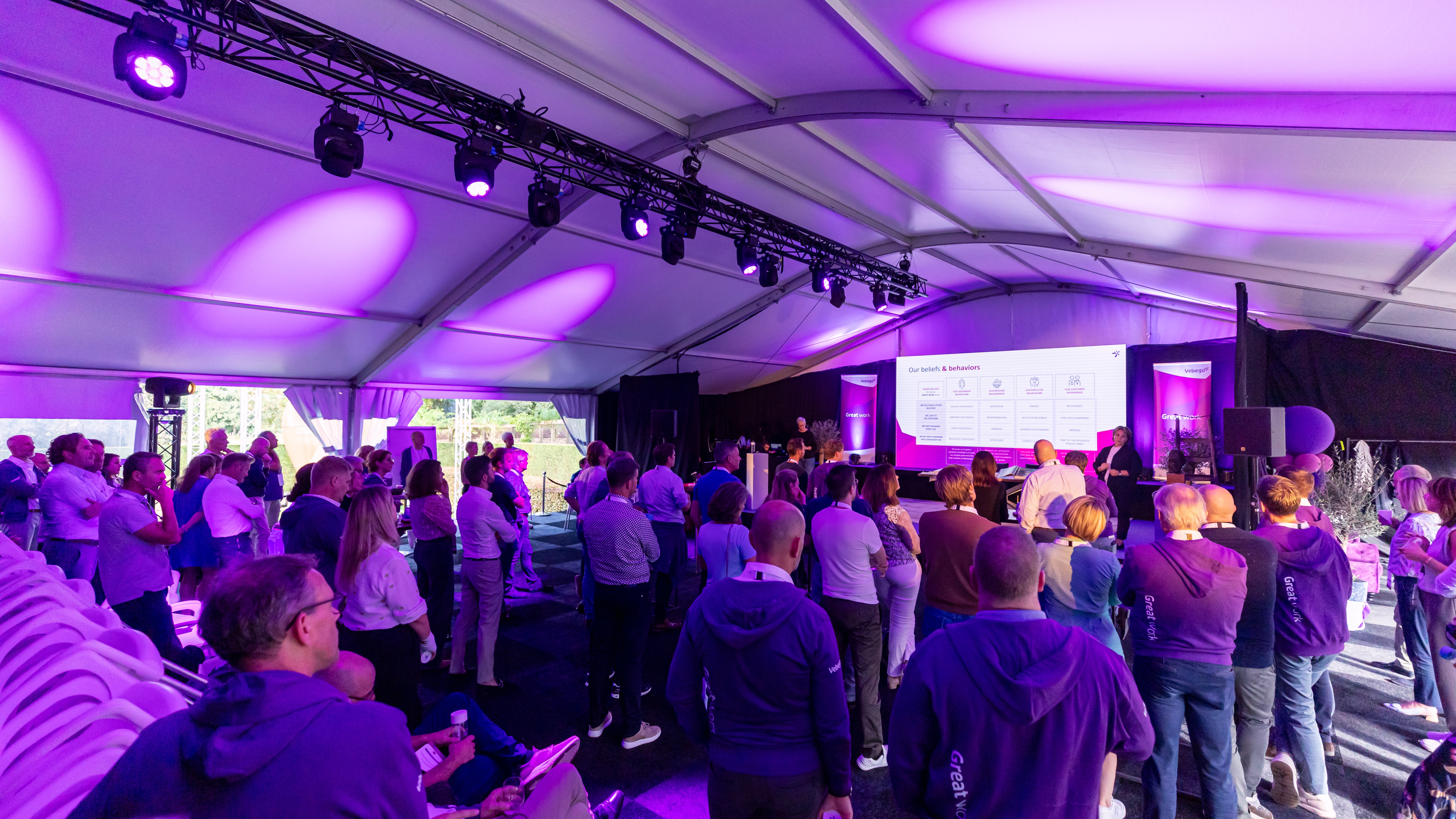Employees
Our role as a Strategic Architect
As a result of Designing our Future, the role of Vebego Group is being shifted towards that of a Strategic Architect. As a Strategic Architect, it is our job to cheerlead strategic objectives, decide on group-wide strategy, target groups, KPIs and timelines. Central to this role, we are taking on the brokerage role and are emphasising the collective responsibility of the companies towards our strategic objectives. The scope of Vebego Group (our holding organisation) has therefore been changed to the leaders of the Vebego companies; our Vebego Leadership Community. This impacts the role towards the companies and of the companies themselves: we foster an environment that encourages entrepreneurship, so that each company can leverage its unique strengths in the market and steer on key people. And by doing so, we strengthen the power of the collective and build synergy across all our companies.
Our Beliefs & Behaviours
Together with the entire Vebego Leadership Community, we started a journey to build a culture of recognition, one that would explicitly define the implicit essence of our Vebego culture. Our quest was an ambitious one: to define an overarching culture that would resonate with the very core of our identity. We did not tread the conventional path; we used a reversed method and started with our desired experience that we want to create, then moved to our customers and the wider society we are proud to serve.

Defining an overarching culture at the Vebego Leadership Conference 2023
During various sessions we worked towards unique ‘Purple Prints’. Each print embodied what makes Vebego exceptional and what has been established in our DNA for more than 80 years. We decoded all words, phrases, and sentiments into a final statement: our Beliefs & Behaviours. We aligned this with our vision, mission, purpose and ambition. By doing so, we succeeded making our implicit culture explicit. The first steps in implementing our Beliefs & Behaviours are set, e.g. all our leaders are being trained in storytelling so we can get our Great stories out there and lead by example.
Number of employees

The number of permanent employees was 30,881 at the end of 2023, a decrease compared to 2022 (31,886). This decline is due to several factors. Firstly, the tight labour market, which is attractive for employees and allows them to change jobs more quickly. Secondly, the loss of employees to a customer who decided to insource their cleaning activities. Thirdly, the ageing population has led to a higher proportion of employees leaving due to retirement. And lastly, we have seen a decrease in the number of temporary workers in our German staffing business.
Of our workforce, 77% are employed part-time, with women comprising 67%. Furthermore, we engage over 800 independent healthcare professionals and nearly 7,000 employees through our joint ventures.
Number of employees per country | 2023 | 2022 | ||
The Netherlands | 12,706 | 13,304 | ||
Germany | 8,756 | 9,164 | ||
Switzerland | 6,780 | 6,754 | ||
Belgium | 2,639 | 2,664 | ||
30,881 | 31,886 |
Employee Engagement
One of our strategic objectives is enhancing employee engagement. It is our purpose to deliver meaningful impact to help build a better world. We do this by empowering our employees, developing their talents and encouraging their resourcefulness, so they are able to do every job to the best of their abilities and with a smile on their face. Appreciating every employee for who they are and what they can bring is crucial for increasing engagement.
By implementing measurements as Great Place To Work and Assist Analytics, we ensure ongoing engagement within the organisation. Through the collection of data and the identification of trends, we pinpoint areas for improvement to optimise engagement. This approach focuses on what has happened (descriptive), but also what is likely to happen (predictive) and how we can influence it (prescriptive). By proactively addressing issues and setting targeted goals, we can effectively steer engagement.
GPTW-certified companies: Alpheios (BE|NL), Care (BE), Hago Airport Services, Vebego AG (CH), Vebego Group, Vebego Facility Services (D). Companies who worked with Assist Analytics: Vebego Cleaning Services (NL), Hago Zorg (NL).
View on Talent
To build the most fitting workforce for the future and leverage the capabilities of our employees, we need to show them that they are valued by recognising their contributions and create a culture of recognition. With View on Talent, we focus on the retaining and developing part of Talent Management. It also provides data and insights towards development, current ambitions, diversity of talents and succession planning needs. Moreover, with View on Talent we provide the processes and structure for identifying and understanding the leadership pipeline in the organisation and emphasise and facilitate ongoing learning and development.
One of the elements we evaluate is the talent of the employee; their most intrinsic contribution to the development of any service, process or product based on the position on the Growth Curve of the AEM-Cube*. During Ambition Interviews the supervisor and the employee talk about this specific talent, current ambitions and development needs. In 2023, we implemented the View on Talent programme for the entire Vebego Leadership Community.

* We have been using the AEM-Cube as a development tool, creating understanding and a common language for people to unleash their potential and work together on effective and inclusive leadership since 2005. The AEM-Cube is developed by Human Insights.
Diversity
At Vebego, we believe in Connect & Embrace as a core value, which means that all are welcome and are given the opportunity to thrive within our organisation. This is why we see diversity as being essential in building the strength of our organisation. Furthermore, diversity is needed for developing and maintaining our talent for the future.
The diversity policy of Vebego currently focuses on gender balance within top management. Our strategic target is to have 33% female co-workers in our top 3 management layers and key positions, and 40% of our Supervisory Board members to be female.

In 2023, the Supervisory Board had a ratio of 40%; two female and three male members. At the moment of publication of this annual report, the ratio is 33% as there are now six members in the Board instead of five: two female and four male members. This is a temporary situation; Jan van Hoek will leave the Board on 1 July 2024, while his successor Leo Brand joined the Board on 1 February 2024, to ensure a proper handover. After that date, the Board will consist of two female and three male members again. The ratio for the Executive Board was 29% in 2023, the new Board of Directors consists of four members: two female and two male members; the ratio is 50%.
From the end of 2023 onwards, for total Vebego the ratio was around 25%. In The Netherlands the overall target of 33% is met, partly due to the DoF restructuring. This involved significant changes in management positions, were we have had the opportunity to improve the gender balance. In Belgium, Germany and Switzerland we have not had this type of change and the management teams are still predominantly male. Improving the gender balance in these teams takes time, as it depends on natural outflow, gradual changes and finding the right candidates. We are currently investigating how to improve the ratio in these countries. For example, in current vacancies in these countries, we explicitly search for females as preferred candidates.
Inclusivity
Since Vebego was founded, we have had a strong belief in inclusivity and making sure all employees feel that they are part of our organisation. In 2022, an employee scan was conducted. This scan showed us from an overall perspective that employees who feel different from other employees (visible or non-visible), are being included and feel accepted for who they are in our organisation. Where needed, we have adjusted our policies on inclusion. A measurement will be performed among top management again in 2024.
Distance from the labour market
Providing meaningful jobs and making a positive difference in the quality of people’s lives is at the heart of Vebego. Part of the quality of life is being a productive member of society; having a job is essential in this. Vebego therefore has a strategic objective to provide jobs to people with a distance from the labour market. The target connected to this objective is that, by 2030, 30% of our total workforce will consist of co-workers with a distance to the labour market.
Having a distance from the labour market can have many causes: physical, mental, medical and social. The way in which people with a distance could still have a meaningful job within our organisation can vary widely from country to country and company to company. This is why in 2023 the Vebego companies were asked to decide themselves on their target groups and what they can contribute to the overall target.
Financial health of employees
Within Vebego, many of our employees live on an income around the social minimum. This can lead to potential debt issues. Financial difficulties can cause stress, absence and risk of work-related incidents. Financial difficulties should not be part of someone’s (working) life and should not have a place in Meaningful Jobs. This is why, together with 14 other Dutch companies, Vebego has formed the National Coalition for Financial Health. The Coalition was founded on 29 November 2022 in Amsterdam. Through this partnership, companies and organisations work together to have a positive impact on the financial health of their employees. The coalition actively works on topics like improving financial knowledge and developing a methodology to anonymously measure the financial well-being of employees.

Queen Maxima joined the Dutch National Coalition for Financial Health at a site visit at IBN.
Vebego has committed to the leadership of the Coalition and contributes financially and with knowledge and cooperation, to enable the activities of the Coalition. The overall goal is therefore to have 50% fewer employees in financially unhealthy or vulnerable situations by 2030.
In 2023, Vebego implemented a set of possible interventions. An example of this is Geldfit, a digital survey designed for employees to anonymously share their financial situation. Depending on their responses, they are directed to relevant public institutions that can offer assistance. Part of Geldfit is Budget Coach, where employees can ask questions about their financial situation and advice is given.
Labour Market development & trends
Belgium
The developments in the Belgium labour market were similar to those in 2022. The biggest challenge is still the tight labour market. We had difficulties finding employees for specific vacancies that are known to be difficult to fill and, in some regions, for operational vacancies. We had to work more with employment agencies compared to previous years. We managed to work around employer branding so that we could create more brand awareness. But also, from a People & Culture perspective we wanted to shift the focus from attracting new employees, to make sure we retain and develop our current employees. Even though the retention rate is good, we still want to focus on this rate due to the ongoing fight for talent on the labour market.
Another development we are facing, is preparing our company for the next generation and the new mindset on the labour market. As a company it is important to know what the ‘must haves / nice to haves’ are in attracting new employees, but also in retaining our current staff. We are in a situation in which we cannot only look from the perspective of an employer (‘what do you bring to the table?’). We are forced to look from the perspective ‘what do we, as a company/employer, offer or bring to the table?'.

Germany
In Germany the trend of an increasing labour shortage has continued in 2023. For our industry and specifically for Vebego Facility Services this means that – unlike in the past – before submitting an offer, it is necessary to intensively assess whether it will be possible to provide the required number of employees. In some cases, this leads to tenders not being submitted at all. As an organisation, we have responded to this by trying to position ourselves as a particularly attractive employer. To this end, we have successfully completed the Great Place To Work certification and can now use this logo in our recruitment activities. On the other hand, we are striving, more than ever, for cultural diversity within Vebego Facility Services. To make work more attractive, we are exploring, together with our customers, whether cleaning can also take place during the day, among other things. This could make working hours more appealing. We are also looking into whether heavy work can be supported by using robotics/cobotics.
The Netherlands
For all our branches in the Netherlands, our focus in 2023 was not only attracting new employees, but particularly investing in employee retention and development. There was also a focus on organising work differently. Due to an ageing workforce, it is more difficult to attract employees; many of our own employees will also leave the organisation due to retirement in the coming years, resulting in a growing number of vacancies. On the other hand, we see an increasing part of the labour market who is attracted by our purpose and are who actively seeking an employer aiming for a better world. We respond to these developments in various ways:
We are making choices that better fit our ‘Meaningful Jobs. Great Work. Better World.’ philosophy.
We are aiming to be an attractive and visible employer by focusing on employer branding and targeted campaigns.
Together with our customers, we are discussing absorbing the higher salaries and flexibility in our services, e.g. making new agreements with customers about the services to compensate for the lack of employees.
We are focusing on a state-of-the-art working environment: employees need more autonomy and flexibility in their work. They want to be able to decide where, when and how much they work.

Switzerland
In Switzerland, we are experiencing a shortage of resources on the labour market. It is becoming increasingly difficult to fill positions across all organisational layers, even the more common positions. Employees can often pick and choose, and working conditions are becoming increasingly important. Due to the scarcity in the labour market, the workload of existing employees has increased substantially. We are constantly expanding our employer branding, improving our conditions, increasing our share of apprentices and focusing on retaining and developing our employees in the organisation. We are also exploring other employment models, e.g. day cleaning. But most importantly, we strive to create a culture where people enjoy working.
We are making choices that better fit our ‘Meaningful jobs. Great Work. Better World.’ philosophy.
We are aiming to be an attractive and visible employer by focusing on employer branding and targeted campaigns.
Together with our customers, we are discussing absorbing the higher salaries and flexibility in our services, e.g. making new agreements with customers about the services to compensate for the lack of employees.
We are focusing on a state-of-the-art working environment: employees need more autonomy and flexibility in their work. They want to be able to decide where, when and how much they work.
